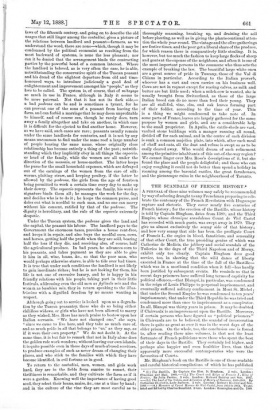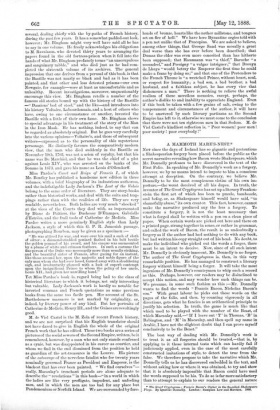THE SCANDALS OF FRENCH HISTORY.*
A PERUSAL of these nine volumes may safely be recommended by way of sobering draught to any Frenchman preparing to cele-
brate the centenary of the French Revolution with Hugoesque rapture and rhetoric. They cover nearly five centuries of French history ; for the erection of the Bastille, whose history is told by Captain Bingham, dates from 1380; and the Third Empire, whose chronique scandaleuse Count de 'Viol Castel has recorded with much gusto, was swept away in 1870. They give us almost exclusively the seamy side of that history ; and bow very seamy that side has been, the profligate Court of Francis I., the orgies in blood, fanaticism, and sensuality of that other Court, the true presiding genius of which was Catherine de Medicis, the jobbery and social scandals of the Tuileries in the days of the Third Napoleon and of Moray, exhibit only too clearly. Captain Bingham does good service, too, in showing that the wild dance of liberty executed in France at the time of the fall of the Bastille— which was in a moribund condition when it fell—has hardly been justified by subsequent events. He reminds us that in recent days prisoners have suffered long terms of captivity for political offences,—that Blanqui, in particular, was condemned in the reign of Louis Philippe to perpetual imprisonment, and eventually suffered solitary confinement in Mont St. Michel; that under the Second Empire he was condemned to ten years' imprisonment; that under the Third Republic he was tried and condemned more than once to imprisonment as a conspirator. In all, Blanqui was thirty years in prison. It may be doubted if Clairvaulx is an improvement upon the Bastille. Moreover, if certain persons who have figured as "political prisoners" in Clairvaulx are to be believed, the scandal of incarceration there is quite as great as ever it was in the worst days of the elder prison. On the whole, too, the conclusion one is forced to, after reading these nine volumes, is that not the least fortunate of French politicians were those who spent the best of their days in the Bastille. They certainly led higher, and perhaps also happier and even healthier lives, than their apparently more successful contemporaries who were the favourites of Courts.
Mr. Bingham's book on the Bastille is one of those readable and careful historical compilations of which he has published
(1.) Th4 Bastille. By Ctiptain the Hon. D. Bingham. 2 vole. London : Chapman and Hall. 1888.—(2.) The Court and Reign of Francis I, Ring of France. By Jolla Pardon. 3 vole. London : Richard Bentley and Ron. 1887. —13.) The Last of the Valois. and Accession of Henry of Navarre. 1689-1589. By Catherine Oh irlotte, Lady Jackson. 2 vole. London : Richard Bentley and Son. 1:::.—(4.) Memoirs of Count Horace de Vie! Castel. front 1861 0 1864. Trans- lated and Edited by Charles Benefield. 2 vols. London: Remington and Co. 1888.
several, dealing chiefly with the by-paths of French history, during the past few years. It has a somewhat padded-out look, however ; Mr. Bingham might very well have said all he has to say in one volume. He freely acknowledges his obligations to M. Ravaisson, who devoted thirty years to arranging the papers found in the old fortress-prison when it fell into the hands of what Mr. Bingham profanely terms "an unscrupulous and sanguinary rabble," and who died just as he had com- pleted the sixteenth volume of its archives. The general impression that one derives from a perusal of this book, is that the Bastille was not nearly so black and bad as it has been painted, and that other and less detested prisons—our own Newgate, for example—were at least as uncomfortable and as unhealthy. Recent investigations, moreover, unquestionably encourage this view. Mr. Bingham retells a number of the famous old stories bound up with the history of the Bastille —" Damiens' bed of steel," and the like -and introduces into his history Voltaire, Labourdonnais, and a host of others who have, owing to one circumstance or another, invested the Bastille with a little of their own fame. Mr. Bingham shows to special advantage in his treatment of the story of the Man in the Iron Mask. He has nothing, indeed, to say that can be regarded as absolutely original. But he goes very carefully into the various opinions—Voltaire's, and those of subsequent writers—expressed as to the personality of this mysterious personage. He distinctly favours the comparatively modern view, that the man who died suddenly in the Bastille on November 19th, 1703, was not a scion of royalty, but that his name was De Marchiel, and that he was the chief of a plot against Louis XIV., who was arrested on the banks of the Somme in 1673, and gave his name as Louis d'011endorff.
Miss Pardoe's Court and Reign of Francis I., of which Mr. Bentley has published a handsome new edition in three volumes, with a brief biography of its industrious authoress, and the indefatigable Lady Jackson's The Last of the Valois belong to the same order of literature. They are story-books rather than historical works, and deal with the suits and trap- pings rather than with the realities of life. They are very readable, nevertheless. Both ladies are very much "shocked" at the vices of the Courts they deal with, as impersonated by Diane de Poitiers, the Duchesse D'Etampes, Gabrielle d'Estrees, and the frail tools of Catherine de Medicis. Miss Pardoe writes a more genuinely English style than Lady Jackson, a style of which this G. P. R. Jamesish passage, photographing Bourbon, may be given as a specimen :—
"He was attired for war, and wore over his mail a sash of cloth of silver : a diamond-studded poniard flashed in his belt beside the golden pommel of his sword, and his casque was surmounted by a plume of white and crimson feathers. In such a costume the fine person of the Duke was necessarily more than usually striking, and the beautiful sister of Francis, after gazing for an instant, like those around her, upon the majestic and noble figure of the only man whom she had ever loved, turned away with a shuddering sigh, and involuntarily glanced with a look of superb contempt upon the insignificant Prince to whom the policy of her uncle, Louis XII., had given her unwilling hand."
Yet Miss Pardoe's book is, regard being had to the class of historical literature to which it belongs, not only interesting but valuable. Lady Jackson's work is hardly so notable for
inverted commas and French quotations as some previous books from the same too facile pen. Her account of the St.
Bartholomew massacre is not marked by originality, or, indeed, by literary power of any kind. But her portraits of Catherine de Medicis, Henry III., and the Guises are revoltingly good.
M. de Viel Castel is the M. Zola of recent French history, and we are not surprised that his English translator should not have dared to give in English the whole of the original French work that he has edited. These two books are a series of
pictures of the social sewers of the Second Empire, written, be it remembered, however, by a man who not only stands confessed as a cynic, but was disappointed in his career as courtier, and whom we find in the end dismissed from the position he held as guardian of the art-treasures in the Louvre. His picture of the entourage of the nerveless fatalist who for twenty years nominally governed Prance as President and Emperor, is the blackest that has ever been painted. "We find ourselves "- really, Macaulay's trenchant periods are alone adequate to describe the " revelations " in this book—" in a world in which the ladies are like very profligate, impudent, and unfeeling men, and in which the men are too bad for any place but Pandemonium or Norfolk Island. We are surrounded by fore-
heads of bronze, hearts like the nether millstone, and tongues set on fire of hell." We have here Byzantine orgies told with a pen not unlike that of Procopius. We are asked to believe, among other things, that George Sand was morally a great deal worse than she has ever before been described; that Dumas the elder was even more conceited than has hitherto been supposed; that Hausmann was "a thief," Baroche "a scoundrel," and Persigny "a vulgar intriguer ;" that Drouyn de Lhuys "would betray the Emperor the first time he could make a franc by doing so ;" and that one of the Pretenders to the French Throne is "a wretched Prince, without heart, soul, or respect for hnmanity ; a had son, a bad brother, a bad husband, and a faithless subject, he has every vice that dishonours a man." There is nothing to relieve the awful realism of these merciless memoirs, except, perhaps, the author's dislike to and inability to appreciate England. Even if this book be taken with a few grains of salt, owing to the temperament and circumstances of the author, it will have to be ansitered by such literary partisans as the Second Empire has left to it, otherwise we must come to the conclusion that there were not ten righteous men in that Sodom. M. de Vie! Castel's kindliest reflection is, "Poor women! poor men I poor society ! poor everybody !"



































 Previous page
Previous page